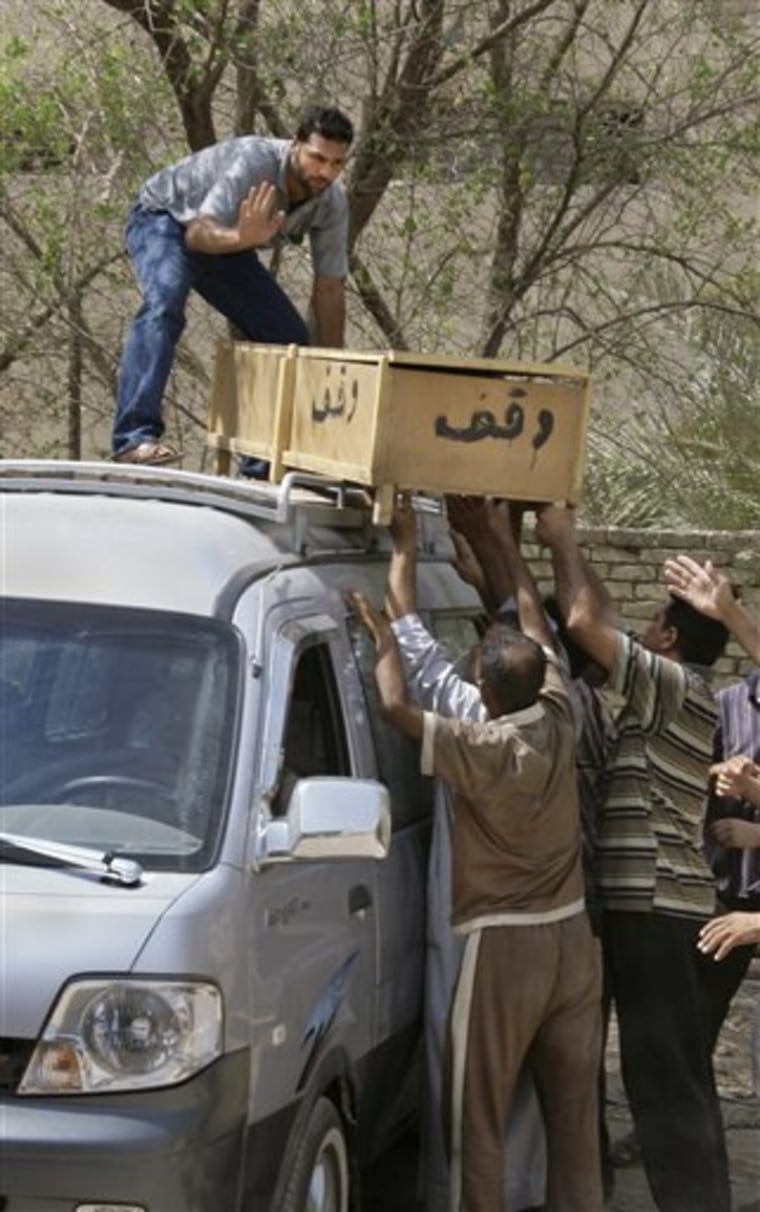Salam Dawood sat in his car stuck in traffic. A mother and her two sons shuffled among the vehicles, begging for money when a roadside bomb exploded.
The toll was low by Baghdad standards: Dawood and another man were dead. The mother, her sons and five others were wounded, according to police and hospital officials.
But Tuesday's blast — a bomb hidden under a pedestrian bridge — represents the lingering perils in a city slowly emerging from years of almost unchecked violence.
Small-scale bombings and shootings persist in the capital — each a reminder that the war is not over and that Baghdad remains a place where no trip is routine and residents are still guided by precautions.
Most won't drive at night. Many try to avoid heavily clogged streets, remembering that suicide bombers and other attackers intent on killing large numbers of civilians favor traffic jams or congested areas.
Key to stability
Baghdad is the key to stability in Iraq as the center of government and as a potential symbol of reconciliation among rival groups. This flagship role, however, also makes it coveted ground for militias and insurgents fighting efforts to fully restore order.
The U.S. military warns consistently that the security gains, though dramatic, are not irreversible and that the relative calm is fragile.
Dawood was two miles from his office in central Baghdad's Khilani Square where he worked as a civil engineer when the bomb exploded. It was stashed near a police post, although it was unclear whether that was the target.
The blast killed him and Hameed Miziel, a 37-year-old laborer, according to officials who spoke on condition of anonymity because they were not allowed to talk to the media.
Moments before the blast, mechanic Qassim Mohammed jumped out of a minibus, deciding to walk the rest of the way to his shop despite the punishing Baghdad sun. None of those who stayed in the bus was hurt.
"I saw the fire of the explosion and two women fell on the street. Then, I found myself at the hospital with wounds to my right shoulder and leg and shrapnel wounds on my face," he said later at a nearby hospital.
The mother, who gave her name only as "Umm Mohammed" or "mother of Mohammed," said she chose to beg in that area — a busy intersection lined with car and generator repair shops — because she thought it was safe.
"I used to beg in different areas, but recently I came to this intersection because I thought it was safe there. Thank God, my injury and my sons' were not serious," the 36-year-old widow said from the hospital where she was treated for a leg wound.
In Baghdad, however, safe is a relative term.
U.S. and Iraqi officials do not routinely release figures on the number of bombs that explode each month in Baghdad, citing security.
According to Iraqi police, however, at least five small bombs explode on average each month in the area where the bombing occurred Tuesday: near the intersection on the eastern side of the Tigris River. Less than two weeks ago, a pair of bombs exploded almost simultaneously near the intersection, killing three civilians.
Attacks at lowest levels in four years
Nevertheless, attacks throughout Iraq are at their lowest levels in four years, according to the U.S. military.
August was one of the least deadly months since the 2003 U.S.-led invasion.
Still, at least 360 civilians were killed and more than 470 wounded in violence throughout the country, according to an Associated Press count.
In comparison, nearly five times as many civilians died violently during the same month last year, according to the AP tally.
Much of the credit for the drop in violence goes to the U.S. troop buildup of 2007, a cease-fire by the main Shiite militia and a Sunni Arab revolt against al-Qaida in Iraq.
With more soldiers in Iraq, the U.S. military was able to clear villages just outside the capital which extremists had used to rig deadly truck bombs which could claim scores of lives in a single blast.
Iraqi soldiers and police maintain checkpoints around the city, checking for explosives and vehicle bombs.
With that, police say militants are now resorting to low-tech explosives, which kill fewer people but are often more difficult to detect because they use pressure plates or other simple trigger devices.
That is small comfort, however, to the families mourning the latest victims.
Dawood's neighbor Ahmed Jassim was at his fabric shop when he got the news that his friend had died in Tuesday's blast.
Dawood, a 42-year-old husband and father, had dropped by Jassim's home the night before to talk about Ramadan, the Muslim holy month of fasting which began this week. For Iraqi Shiites like Dawood, Tuesday was the first day of the fast.
"We talked about fasting, and I am sure that he was fasting when he died," Jassim said. "It is just so painful to have such an incident in the first morning of Ramadan."
